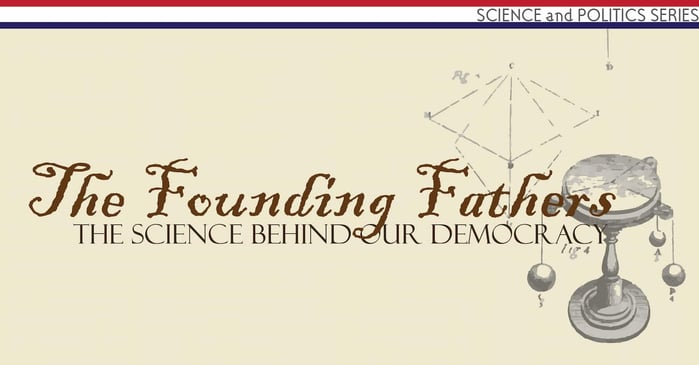
As we enter the heated month before Election Day, we are going to take an opportunity to explore the relationship between science and our government over the course of a few blog posts. We’ll explore a few key questions: How important was science to the Founding Fathers who penned the documents that still guide us today? How have Presidents interacted with the advancement of science since the birth of our nation? Just how involved is our current government in science, and finally, how do the two major party candidates differ with relation to science? Stay with us over the next few weeks to find out!
We’ll start today with the birth of our nation. Our nation’s Founding Fathers set in motion the workings of our government, working together to create “a more perfect union.” Many of these early leaders are well-known for their intelligence, wisdom, strong beliefs, and vision for democracy. What many of us may not realize, however, is the impact that scientific thought had on the decisions these men made.
The United States of America came to be during the Enlightenment, a period of time when discoveries, technology, and scholarship elevated rational thought based on experimental evidence. This “Age of Reason” established the scientific method, a way of determining truth through experimentation, dissemination of results, and open critique by colleagues. So when the leaders of the Colonies began thinking about how to govern themselves and how to ensure safety and prosperity for the growing population, they embraced this rational approach to their collaboration.
One of the rational approaches the Founding Fathers took was to look back at history for examples of good – and bad – governments and laws. By drawing from history’s successes and failures, they were practicing a major tenet of a scientist: the literature review. What has been done already? What do we know? What can we learn from it? What can we add to this body of work?
Another rational and scientific philosophy that influenced these early leaders was the idea of immutable, natural laws. These men were well-versed in the growing discovery of laws that governed Nature, from Newton’s laws of motion to the classification of plants and animals. They applied this reason to the rights of mankind: “We hold these truths to be self-evident, that all men are created equal, that they are endowed by their Creator with certain unalienable Rights, that among these are Life, Liberty, and the pursuit of Happiness.” And while the writers of the Declaration of Independence did not have all people in mind when they wrote these words (Native Americans, women, slaves, and others), the philosophy stems from a belief that Nature was rational and mankind should aspire to the same.
Reading documents from this era reveals that science and scientific analogy were an important part of discussions about government and laws. John Adams, our second President, was by no means a scientist, but his arguments for having three branches of government instead of two was grounded firmly in scientific reason. Using arguments from the physics of equilibrium, he argued that two systems can never be in balance, that one will inevitably gain more power, requiring a third system to keep them all in check. From this argument came our current Executive, Legislative and Judicial branches and our ideas of “checks and balances.”
Thomas Jefferson also employed a scientific mindset in his contributions to the development of our American government. Arguably the greatest scholar to ever be President, Jefferson’s dedication to rational thought played a significant role in ensuring religious freedom in our nation. Jefferson believed that “Freedom [is] the first-born daughter of science,” placing rational thought at the forefront, paving the way for freedom, independence, and all liberties we claim as Americans.
One of our Founding Fathers was a well-known and successful scientist well before he helped form our nation, bringing a pragmatic approach to his contributions – Benjamin Franklin. A self-made scientist with little formal education, Franklin was nonetheless the consummate scientist, setting up experiments and sharing his results with the scientific community. His work led to the creation of the new field of electricity science, where he not only made landmark discoveries but also coined the term “battery” and the “positive (+)” and “negative (-)” terminology for charges. His success as a Founding Father and later as a diplomat rested a great deal on this pragmatism, valuing evidence, statistics, modeling, and patience when making decisions.
There have been significant injustices in our nation’s past – the cold rationality of declaring a slave 3/5 of a person, for example – that have attempted to use “reason” to oppress, manipulate, or exclude equal participation. When we as a nation face issues like these even today, however, we should remember that science and rational thought are a part of our legacy, and are woven into the fabric of what makes our nation today. We can employ those same approaches – research, logic, argument, experimentation, critique, patience – to help us solve today’s problems.
In our next post, we’ll explore the major interactions of science and our Presidents, starting with a vaccine that may have won us the American Revolution.

